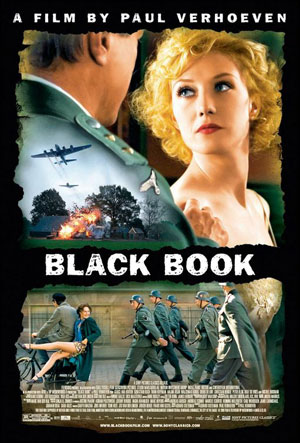 Black Book is a Paul Verhoeven film, so you expect shocking, titillating moments. They’re there – a girl dyes her pubic hair, a Jewish resistance fighter sleeps with a Nazi, a giant vat filled with shit is dumped on someone – but it’s the murky moral ground where he sets the film that makes Black Book one of Verhoeven’s best ever.
Black Book is a Paul Verhoeven film, so you expect shocking, titillating moments. They’re there – a girl dyes her pubic hair, a Jewish resistance fighter sleeps with a Nazi, a giant vat filled with shit is dumped on someone – but it’s the murky moral ground where he sets the film that makes Black Book one of Verhoeven’s best ever.
Rachel (Carice van Houten in a performance that is brave and exciting) is a Jew living in the attic of a Dutch family’s farmhouse at the tail end of WWII. When a stray bomb destroys her secret home, Rachel decides to escape out of Nazi-occupied territory. She meets up with her family, who have also come out of their respective hiding spots, and puts her fate in the hands of a human smuggler. Again things go badly and Rachel ends up living with members of the Dutch resistance, dying her hair blonde to hide in plain sight. When an arms smuggling mission goes wrong (nothing works out for these people) and some of the resistance members end up in a Nazi prison awaiting execution, Rachel takes on her most dangerous role yet – she must infiltrate the Nazi headquarters and make the local SS commander fall in love with her so she can get access to the prison and help mount a rescue.
Things get complicated though, as Rachel falls in love with the officer (The Lives of Others star Sebastian Koch, one of the only actors today who looks how I grew up believing manly movie stars should look) and he turns out to not be such a bad guy. Some elements in the resistance turn out to be less than savory after all, and the idea of what is a hero and what is a villain get turned on their heads.
Black Book is a sprawling, long epic of a film, a movie that feels refreshingly old fashioned in that is has a massive scope but always keeps the characters squarely in the spotlight. Verhoeven is a gifted storyteller, and so the movie is completely captivating just from the point of view of watching Rachel go through her travails as she slowly becomes a stronger and stronger woman. But it’s the moral issues that he examines that make Black Book a great film. World War II is probably the most black and white conflict in living memory, and upending the good guy/bad guy apple cart is a bold move. Verhoeven manages to do that without apologizing for anything the Nazis did, but he still makes us question the ways we see each other and our enemies in war.
Verheoven’s leads, two of the best actors working today in any language, give him the ability to go where he does. Without actors as talented and relatable as Koch and van Houten, the whole film would flounder. It certainly doesn’t hurt that van Houten is almost breathtakingly beautiful, with a burning intelligence that anchors her whole performance. These two are ably supported by a number of terrific actors in smaller roles, but the one who stands out the most is Halina Reijn, who plays the brassy, slutty redhead Ronnie, a Dutch woman collaborating – and sleeping – with the Nazis. At the beginning of the film Ronnie is an annoyance, a glaring cartoon of a character, but little by little Verhoeven’s script and Reijn’s empathetic performance give her depths and levels I never expected.
The film itself follows a similar arc, slowly opening up new layers. The plot is winding and sometimes complex, but Verhoeven is able to balance the action and melodrama with his thematic concerns. By the end of the film, as the Dutch people begin turning on collaborators in their midst, the audience has come to a very different emotional place. How is it possible to feel bad for these people who threw in with the Nazis rather than fight? Partially it’s because it’s so easy to see that they were humans, too, and they did what they thought they needed to do. I found myself torn at the end, wanting to have revenge served on these people but also understanding their own essential dilemma. That’s what great cinema should do – you should walk out of the movie theater with some thoughts to really chew over for days and weeks to come.
It’s taken him a long time, but Verhoeven has finally come to a place where he can perfectly balance his populist, lowbrow impulses with his desire to say something important. Robocop and Starship Troopers have those elements, but both end up overpowered by their giddiness over blood and destruction. Black Book isn’t afraid to shock and arouse, but it’s not afraid to go for big thoughts at the same time.